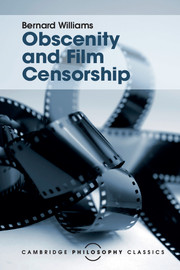Preface to this edition
Published online by Cambridge University Press: 05 November 2015
Summary
Few official reports on public policy become books, still fewer books of lasting relevance. The Williams Report on Obscenity and Film Censorship was produced in 1979 and first published as a book in 1981. It makes the case for a liberal approach to regulating obscene or pornographic printed material, and for rather more restrictive regulation and prohibition of obscene and pornographic images, including film. Its conclusions have been widely accepted in Britain and elsewhere, its criticism of what it dubbed “the chaos of the present law” widely endorsed, and its sparkling and careful arguments both enjoyed and travestied.
Since the report was published, the technological and social context in which we communicate has changed. We no longer live in a world in which publishers and newsagents can control access to obscene content, or broadcasters and film-makers access to pornographic images, or in which governments (or the Post Office, to which the Report often refers!) can use traditional methods to control, to regulate or to censor. Regulating or prohibiting material that some see as obscene or pornographic is harder in the age of the Internet.
However, worries about such material, and particularly about its effects on children and young people, are as acute as they were thirty-five years ago. Even if we agree with the Williams Report that obscene or pornographic content should be available to adults who choose to receive it, but not more widely, it is now unclear how this is to be achieved. How is freedom of expression for those adults to be combined with protecting others from intrusive and unwanted content? How robust are arguments that certain sorts of publication cause harm?
The Williams Report did not find robust evidence of harm caused by encountering pornographic content, but argued (see Chapter 9) that the public display or availability of such material was something that people “reasonably judge offensive” and that providing such material, except to willing recipients, should therefore be regulated or prohibited. Today we might wonder whether we can still find consensus about which sorts of display will be “reasonably judged offensive”.
- Type
- Chapter
- Information
- Obscenity and Film CensorshipAn Abridgement of the Williams Report, pp. ix - xPublisher: Cambridge University PressPrint publication year: 2015



